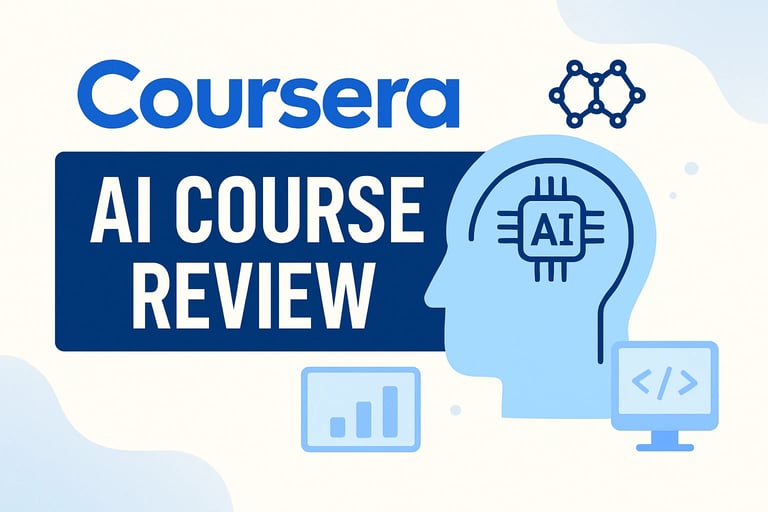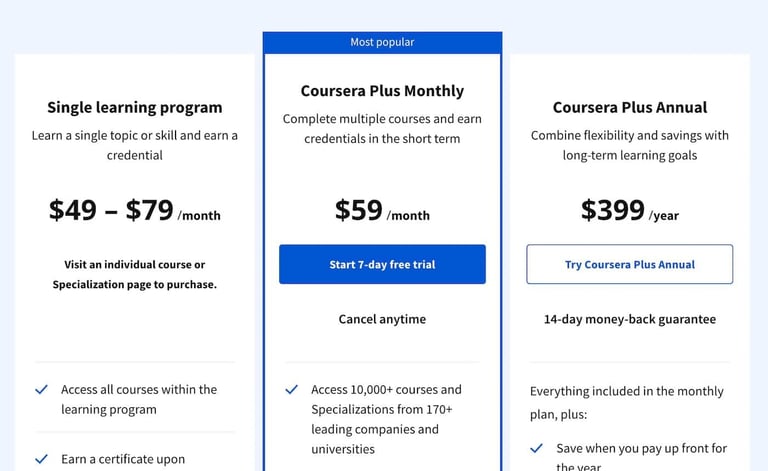Coursera AI Course Review 2025: Is It Truly Worth Your Time & Money?
AI COURSE REVIEW


If you’ve been curious about diving into AI but feel overwhelmed by the options, you’re not alone.
With the AI field booming—projected to grow to a $1.5 trillion industry by 2030—online courses have become a go-to for beginners and professionals alike.
Coursera, with its sleek platform and big-name partnerships, often tops the list.
But the question looms: Coursera Review: Is The AI Course Worth It?
I’ve explored Coursera’s AI offerings extensively, and in this 2025 review, I’ll break down the content, costs, value, and more to help you decide.
From curriculum quality to career impact, let’s see if Coursera’s AI courses deliver—or if you’re better off looking elsewhere.
What Are Coursera AI Courses?


Coursera partners with top universities (like Stanford and Imperial College London) and industry leaders (like IBM and Google) to offer a wide range of AI courses.
You’ll find everything from introductory lessons to advanced specializations, often bundled into tracks like the Coursera AI Specialization. These include certificates you can share on LinkedIn, and many are self-paced, fitting busy schedules.
Whether you’re eyeing the famous Andrew Ng Coursera AI courses or IBM’s AI Engineering track, there’s variety—covering machine learning, deep learning, natural language processing, and more.
Some courses let you audit for free, while others require payment for full access, including certificates.
Who Are These Courses For?
Coursera’s AI courses cater to a broad crowd, but they’re not one-size-fits-all. Here’s the breakdown:
Beginners Curious About AI: If you’re new to AI, start with foundational courses like AI For Everyone by Andrew Ng. No coding or math skills are needed—just curiosity.
Aspiring Data Scientists/Developers: Intermediate learners with some Python or math background (think linear algebra, calculus) can tackle specializations like Machine Learning or DeepLearning.AI TensorFlow Developer.
Professionals Upskilling: Data analysts, engineers, or managers looking to pivot into AI roles will find value in applied courses like IBM AI Engineering.
Career Changers: If you’re transitioning into AI, advanced tracks can build your portfolio, but expect to put in the work.
Prerequisites: Beginners need little to no experience, but technical courses often require Python, basic statistics, and sometimes calculus. Coursera usually lists these upfront—check before enrolling.
Deep Dive – The Core Review
Let’s get to the meat of this Coursera Review: Is The AI Course Worth It? I’ve broken this down into key areas to give you a clear picture.
1. Content Quality & Curriculum
Coursera’s AI courses shine in their depth and relevance, often updated to reflect 2025’s AI trends—like generative AI and ethical AI practices.
For example, Andrew Ng’s Machine Learning Specialization (a classic since its Stanford days) covers supervised learning, neural networks, and more, with practical examples like predicting housing prices.
The DeepLearning.AI TensorFlow Developer Specialization dives into modern frameworks, teaching you how to build image classifiers—a skill in high demand.
What I really liked was how the courses are organized—they usually start with the theory and then move into hands-on work, often with real-world data.
That said, some of the beginner courses can feel a bit repetitive if you're already familiar with the basics.
And the more advanced ones can be tough if you don’t have a strong background in math. Overall, the curriculum is solid—you just need to choose the level that matches your skills.
2. Instructors & Teaching Quality
The instructors are a major draw. Andrew Ng, a co-founder of Coursera and a global AI leader, brings clarity and authority to courses like AI For Everyone and Machine Learning. His ability to break down complex topics—like gradient descent—into digestible chunks is unmatched.
Other courses feature professors from top schools or experts from IBM and Google, ensuring credibility.
The teaching style is lecture-based, with short videos (5-15 minutes) paired with transcripts and subtitles. I appreciated the clarity, but some courses lack instructor interaction—don’t expect live Q&A. Forums help, but they’re peer-driven, which can be hit-or-miss.
3. Platform & Learning Experience
Coursera’s platform is polished. The UI is intuitive, with a clean dashboard to track progress. Videos stream smoothly, even on slower connections, and you can download them for offline learning—a lifesaver for commutes.
Quizzes are frequent, testing concepts like overfitting in machine learning, but they’re often multiple-choice and can feel basic. Assignments, like coding a neural network in Python, are more challenging, though grading relies on peer reviews, which vary in quality.
The community side is hit or miss. The discussion forums are a great way to connect with people from around the world, but how active they are really depends on the course.
For example, Andrew Ng’s AI courses on Coursera usually have lively discussions, while less popular ones can feel pretty empty. Overall, the platform runs smoothly—but don’t count on getting a lot of guidance or personal support.
4. Hands-on Projects & Practicality
Practicality is where Coursera shines. Most AI courses include hands-on projects—like building a chatbot in the NLP Specialization or creating a recommendation system in Machine Learning.
These projects use tools like TensorFlow and Jupyter Notebooks, mirroring real-world workflows. I built a simple image classifier in the TensorFlow Developer track, which felt rewarding and portfolio-ready.
That said, projects can be overly guided—sometimes spoon-feeding solutions. If you’re aiming for true independence, you might need to supplement with external practice. Still, they’re a solid bridge to real-world tasks, especially for roles like data scientist or ML engineer.
5. Time Commitment & Flexibility
Most courses are self-paced, a huge plus. A typical specialization, like IBM AI Engineering, spans 3-6 months with 4-6 hours per week—about 100 hours total. Shorter courses, like AI For Everyone, take 6-8 hours.
You can speed up or slow down as needed, but deadlines for graded assignments (if pursuing a certificate) can add pressure. I found the flexibility ideal, though the completion challenge of MOOCs is real—more on that later.
The "Worth It" Equation – Cost vs. Value
1. Pricing Model


Coursera’s pricing varies. Individual courses range from $49-$79 for a certificate, while specializations (like Coursera Machine Learning Course) are subscription-based at $49/month until you finish.
Coursera Plus, at $59/month or $399/year, gives access to most AI courses—a better deal if you’re taking multiple tracks. You can audit many courses for free (no certificate), but you’ll miss graded assignments and projects.
Financial aid is available, and some employers reimburse costs. Expect to spend $150-$300 for a specialization, depending on your pace.
2. Certificate Value
Are Coursera Certificate Value AI claims legit? Yes, but with nuance. Certificates from Coursera—especially those tied to names like Stanford or IBM—are recognized by many employers. A 2024 LinkedIn Talent Blog report noted that 75% of hiring managers value online certificates for technical roles, especially when paired with projects.
Adding a DeepLearning. Adding an AI certificate to your resume or LinkedIn can show you're serious about learning, but it’s not a magic pass. Employers still care a lot about real-world experience.
3. ROI
The return on investment hinges on your goals. For knowledge, these courses deliver—offering skills like neural network design that align with AI job demands. Career-wise, they’re a stepping stone.
I’ve seen learners land entry-level roles (e.g., junior data scientist) after completing Andrew Ng’s Machine Learning Specialization, but only with a portfolio and interview prep.
For professionals, the upskilling can lead to promotions or pivots—think software engineer to ML engineer. At $150-$300, the cost is reasonable compared to bootcamps ($5,000+), but you’ll need to apply the skills to see true ROI.
Pros & Cons
Pros
High-quality content from top instructors like Andrew Ng.
Hands-on projects build portfolio-worthy skills.
Flexible, self-paced learning fits busy schedules.
Certificates carry weight with employers.
Access to a global learner community via forums.
Cons
Peer-graded assignments can be inconsistent.
Advanced courses require a strong math/coding foundation.
Community engagement varies by course.
Free audit mode limits access to projects and certificates.
Risk of dropping out without self-discipline.
Popular Coursera AI Course Examples
Machine Learning by Andrew Ng: A foundational Coursera Machine Learning Course covering algorithms, neural networks, and more. Ideal for intermediates with Python skills. Explore it here.
DeepLearning.AI TensorFlow Developer Specialization: Focuses on deep learning with TensorFlow, perfect for developers aiming for practical skills. Projects include building models for image recognition.
Alternatives to Coursera
Coursera isn’t the only player. Coursera vs edX AI: edX offers similar university-backed courses (e.g., MIT’s AI programs), often with more academic rigor but less flexibility. Coursera vs Udacity AI: Udacity’s Nanodegrees (like AI Programming with Python) emphasize mentorship and projects but cost more ($399/month). Free options like fast.ai are great for self-starters but lack structure. Coursera strikes a balance of quality and accessibility.
Overcoming the Completion Challenge
MOOCs have a notorious dropout rate—around 90%. To succeed on Coursera:
Set a weekly schedule (e.g., 5 hours split over 3 days).
Engage in forums to stay motivated.
Focus on one course at a time to avoid overwhelm.
Treat projects as portfolio pieces to keep your goal in sight.
Conclusion
So, Coursera Review: Is The AI Course Worth It? It depends on you. Coursera’s AI courses—like Andrew Ng’s Machine Learning or DeepLearning.AI TensorFlow Developer—offer top-tier content, practical projects, and recognized certificates for a fraction of a bootcamp’s cost.
They’re ideal for beginners, developers, and professionals willing to put in the work, especially with Coursera AI Specialization tracks.
But they’re not perfect—peer grading can be spotty, and you’ll need discipline to finish. If you’re ready to commit and apply the skills, Coursera is a fantastic step in your AI journey. Start exploring Coursera’s AI courses and see where they take you!
About Author:


Hey, I’m Diana R.K ! I’m a digital marketing strategist and a huge fan of all things AI. I’ve spent a lot of time exploring online courses to help people like you dive into the world of artificial intelligence. Whether you're just starting out or looking to level up your skills, I’m here to share honest reviews and tips to help you choose the best AI courses out there. Let’s make learning AI as simple and enjoyable as possible!


